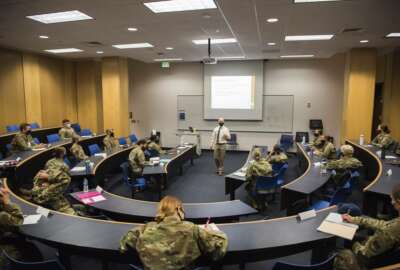Sexual assault, cheating scandals, suicides, climate change issues and needed cyber updates are all problems plaguing the military service academies in recent years.
The superintendents of the three military universities recently told members of Congress that they have plans in place to shift the culture of the student body, prepare future troops for a changing threat landscape and literally save the physical integrity of campuses.
How those plans pan out remains to be seen, but the superintendents stressed the need for change in a structure known for its uptight tendencies.
The House Appropriations Defense Subcommittee hearing comes on the heels of another annual report detailing what many in the military and familiar with the military call a crisis of sexual assault. The report shows 88 reported incidents of sexual assault in the academies from 2019 to 2020. However, the numbers are skewed because students were sent home in the last quarter of the school year due to coronavirus.
The numbers were on track to at least parallel the previous year’s assaults of 122, which were a 32% increase from the preceding year.
“Leadership matters in this space,” Army Lt. Gen. Darryl Williams, West Point superintendent, said. “The Army secretary, the chief of staff, and the sergeant major of the Army have been very clear in terms of how do we get at this.”
Williams said he read the report on Ft. Hood, where the Army is experiencing sexual assault, violence and other issues.
“We talked to every single cadet when they came back from the COVID leave. I led off the session,” he said. “I had my experts, my sexual harassment and assault response and prevention director and others talk and I said, ‘This isn’t about Ft. Hood. This could be any fort. This could be Ft. West Point.’ And we talked to the cadets about personal courage, and what it takes to hold each other accountable as peers.”
Vice Adm. Sean Buck, Naval Academy superintendent, said students trust their commissioned leadership, but not their peer leadership.
“Most of the sexual assaults over time at my academy have been midshipman on midshipman,” he said. “That’s very distressing that it’s blue on blue. Our prevention efforts across all the services and across all three of our academies is getting after prevention, and strengthening the confidence and the ability of our midshipmen leaders to lead themselves with adult supervision. That’s where we’re going to nip it in the bud.”
Issues around the resolve of military students doesn’t just stop at sexual assault. The academies noticed an uptick in cheating as students started taking classes from home. Nearly 250 Air Force Academy cadets were suspected of violating the honor code by not properly citing sources and looking up answers on websites while taking exams. Some of those cadets were placed on a six-month probation.
The incident caused the Air Force Academy to conduct a review of its honor code.
The school’s leader Lt. Gen. Richard Clark said the school had a character leadership symposium where dozens of leaders from the military and civilian world talked with students about what it means to live honorably.
The school is also dealing with mental health issues. Two cadets committed suicide last year. Clark said the lack of face-to-face interaction with students because of COVID makes it harder for teachers and faculty to connect with cadets and pick up on warning signals.
Outside of the student body, the academies are struggling with infrastructure issues. Climate change is threatening the Naval Academy. Buck called it one of the school’s greatest vulnerabilities.
“The Naval Academy was negatively affected by high tide flooding 41 times in a decade. Now we’re experiencing 41 instances of high tide flooding per year,” he said. “It is projected by 2050 that we’ll see this high tide flooding negative effect every single day of the year. What does that mean? It floods out some of our roads, some of the key networks that we bring our workforce on the campus day in and day out, it affects some of our parking lots where they try to park and it affects the entrances and exits to some of our buildings.”
Buck said the school has an advisory council that is working with the Army Corps of Engineers on a study that will be finished this year on how to address the flooding. It may include new drainage systems, sea walls or levees.
Clark described the Air Force Academy’s IT infrastructure as “woefully behind.”
The school in charge of future Air and Space Force leaders needs immediate funding to address the technology gap.
“That funding that is something we need not only now, but into the [future] years. It is vital for us,” Clark said. “In fact, our IT threatens our accreditation, during COVID we recognized our weaknesses as we’ve gone on to more virtual classes. We have great needs from a fiscal standpoint to allow us to meet our aspirations.”
Copyright
© 2024 Federal News Network. All rights reserved. This website is not intended for users located within the European Economic Area.

